 An audit certificate ratifies the truth and correctness of a fact, figure or statement. On the contrary, an audit report contains a statement of fact or expression of opinion about the truth and fairness of the fact, figures and statements.
An audit certificate ratifies the truth and correctness of a fact, figure or statement. On the contrary, an audit report contains a statement of fact or expression of opinion about the truth and fairness of the fact, figures and statements.
Once the auditing process is complete, the auditor must prepare a report in a summarized form. This is what we call an audit report. The audit submits this report to the person or body who appoints him. But in general, the auditor submits it to the shareholders of the company.
In this post, we will explain the difference between audit report and audit certificate.
Content: Audit Report Vs Audit Certificate
Comparison Chart
| Basis for Comparison | Audit Report | Audit Certificate |
|---|---|---|
| Meaning | Audit Report is the expression of auditor's opinion on the financial statement of the company. | Audit Certificate that certifies the truth of the statement. |
| Guarantee | It does not guarantee of accuracy and correctness. | It is a complete guarantee of the accuracy and correctness of the information contained in the financial statement. |
| What is depicts? | Financial statement indicates true and fair view of the company's state of affairs. | Verifies a number of tangible facts and assets on the accuracy of the accounts based on the documentary evidence provided to him. |
| Responsibility | An auditor cannot be held responsible for issuing wrong report. | Auditor will be held responsible, when it is discovered that the audit certificate is wrong. |
| Criticism | May contain constructive criticism | No scope of criticism |
| Format | Format is standard as prescribed by law | There is no standard format |
| Basis | Based on Assumptions and Estimations. | Based on Actual Figures and Facts. |
Definition of Audit Report
An audit report is a document in writing that carries the independent professional opinion of the auditor. This opinion is about the truth and fairness of financial statements in showcasing the results of operations and the financial position of the accounts checked by the auditor. In an audit report, the auditor draws his conclusion on the general reliability of the financial statement. The auditors do not give any guarantee that the accounts are error-free and fraud-free.
In an audit report, the auditor states the conclusion of the checking of the books of accounts of the company that it presents a true and fair view of the financial position.
- The medium through which an auditor expresses his opinion on the financial statements of the enterprise.
- The final product of auditing
- Based on facts and findings
- Attached to the Balance Sheet
What is a True and Fair View?
A true and Fair View of the financial statement means that the financial statement represents what it claims in a clear manner. Also, there is a proper classification and grouping of all material items. In addition, accounting principles are duly complied with.
Also Read: Difference Between Qualified and Unqualified Report
Definition of Audit Certificate
An audit certificate is an instrument that validates the correctness of the financial statement prepared by the client. It contains a guarantee of the accuracy of the accounts. This certificate is an indicator of the genuineness of the financial statement. So, prior to the certification of the statement, the auditor needs to perform a thorough and careful examination of the fact of each and every piece of content written on it.
It implies that the auditor signing or issuing the certificate affirms the truth if the statement that he/she makes.
What if the statement certified by the auditor subsequently proved incorrect?
In such a situation, the auditor will be held responsible for the same, irrespective of the amount of care and skill exercised by him while checking its contents.
When Audit Certificate is considered necessary?
The situations in which an audit certificate is regarded necessary are for:
- Statutory report
- Prospectus
- Liquidation
- Obtaining an import and export license
- Determination of income tax
- Taking loans from banks or financial institutions.
Also Read: Difference Between Audit and Review
Key Differences Between Audit Report and Audit Certificate
The points stated here to explain the difference between audit report and audit certificate:
- An audit report is a written document, in a prescribed format, with the help of which the auditor expresses his opinion on the reliability and correctness of the financial statement of the enterprise. On the contrary, an audit certificate is a confirmation in writing of the accuracy of the facts that it contains.
- Audit Report relies on the verification and analysis of accounting records, books and vouchers. In spite of the fact that it is based on collected and meticulously considered facts, it does not guarantee the accuracy and correctness of the financial statements. As opposed, in an audit certificate, the auditor guarantees the accuracy and correctness of the information contained in the financial statement.
- In an audit certificate, there is no scope for criticism. Further, there is no scope of suggestion and recommendation as well. As against, an audit report may contain constructive criticism.
- An audit certificate is an objective because it relies on facts. Conversely, an audit report is subjective because it contains the opinion of the auditor.
- One cannot hold the auditor responsible for issuing the wrong report. This is because an audit report is only an opinion on the financial statement. On the other hand, an auditor certificate can make the auditor responsible if after the issuance of the certificate it is discovered that anything mentioned in the certificate is not true.
- The audit report is prepared as per the prescribed format. Whereas there is no prescribed format for the preparation of an audit certificate.
Types of Audit Report
- Clean Report: An audit report which is free from any qualifications is a clean report. This report represents that the auditor is satisfied with all the points, which must be present in the report. The auditor states his opinion in an affirmative manner and does not add any reservations to the report.
- Qualified Report: If the auditor expresses an opinion in the report but adds some reservation or says anything which is not in an affirmative sense. However, the nature of the opinion is such that it does not materially affect the true and fair view of the financial statement. Such a report is the qualified report.
- Adverse Report: This report contains a negative opinion about the main point for the purpose of which the audit takes place. In short, the adverse report is one in which the auditor states that the financial statement does not represent a true and fair view of the state of affairs and operational results of the enterprise. The auditor furnishes this report, only when there is some solid and reasonable evidence present to support it.
- Disclaimer Report: If due to certain reasons the auditor is unable to express an opinion and points out the reasons in that report, then this kind of report is a disclaimer report. There has to be some justified facts that back this report.
Types of Audit Certificate
- Certificate for Tax Computation: There are instances when an enterprise needs to get its incomes and expenses certified from a CA, i.e. Chartered Accountant so as to get an exemption in Income Tax. Its ascertainment is according to the provisions of the Income Tax Act.
- Certificate of Import and Export: The applicant who is applying for an import or export license must submit a certificate of import and export from a practising Chartered Accountant, as per Import and Export Trade Control Rules and Procedures.
- Certificate of Circulation: Audit Bureau of Circulations Limited – An association of advertisers and publishers has to furnish reports of circulation figures for the publication of its members. For this purpose, the association issues a circulation certificate depending on the audit certificate of the member. The auditor needs to validate the circulation figure relying on the fact that he has checked and verified the books of account, as to:
- Newsprint consumption,
- Distribution and
- Unsold stock of publications.
Conclusion
When an auditor issues an audit certificate, he becomes responsible for the factual accuracy of whatever is stated in it. As against, when he submits an audit report, he is responsible for making certain that the report is based on factual data to the best of his knowledge, belief and information provided to him.








Asemota Victor says
Beautiful read up. Much on point.